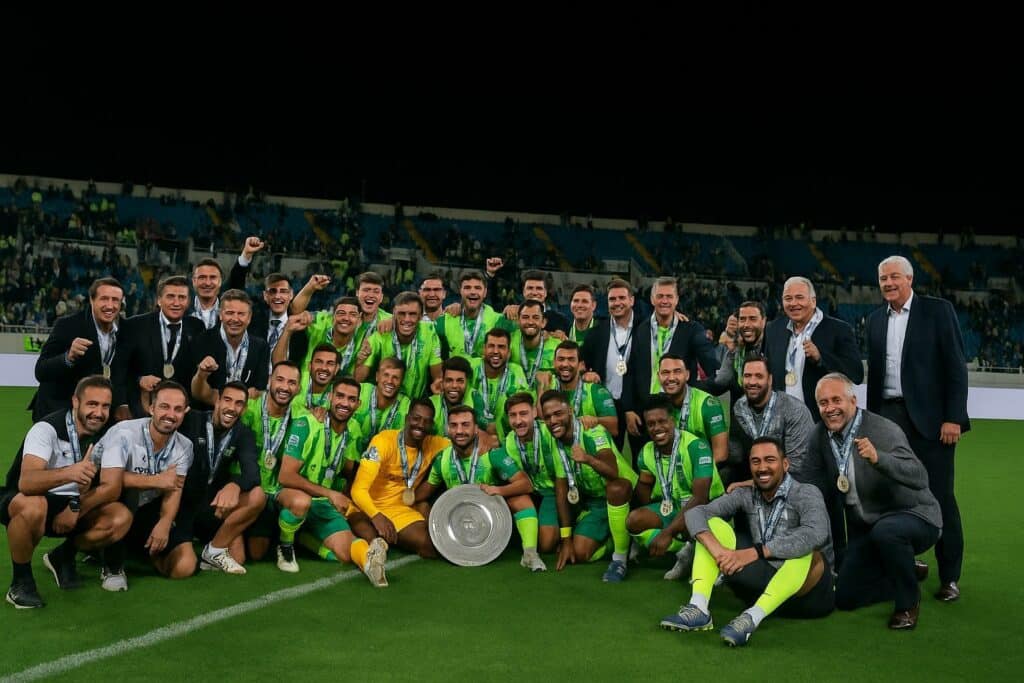Cypriot Super Cup: A Penalty-Drama That Teaches Resilience
The season in Cyprus opened with a contest that rarely deceives neutrals: a Super Cup inevitable collision between the league champions, Pafos FC, and the Cup holders, AEK Larnaka. The ninety minutes closed on a tight 1-1 draw, and the final verdict emerged only after a relentless series of penalties, 5-4 in favour of Larnaka. For Pafos, Congolese striker Mons Bassouamina remained an unused substitute, while versatile midfielder Jérémie Gnali started and fought until the 77th minute before giving way as fatigue seeped through humid Limassol air.
Although neither expatriate forced the headlines, the encounter mattered for the Congolese technical hierarchy observing from afar. Bassouamina’s patience on the bench hints at fierce competition within a squad whose objectives now include European qualification. Gnali’s 77 minutes illustrate his coach’s faith in his work-rate; both attributes nurture the national side’s depth chart in a position—left central midfield—traditionally in need of alternatives.
Georgian Cup: Dila Gori Keeps the Double Alive
One thousand kilometres to the north-east, Dila Gori confirmed its status as the surprise package of the Erovnuli Liga by dispatching Samtredia 2-0 in a Cup semi-final played under persistent drizzle. The victory propels the side into a coveted final and sustains hopes of a historic league-and-cup double. The coaching staff opted for a conservative opening scheme, leaving left-back Romaric Etou on the bench, yet introducing teenage forward Déo Gracias Bassinga at half-time. The Congolese prospect immediately stretched Samtredia’s back line, participating in the build-up to the second goal.
The cameo, modest in duration, may prove definitive in terms of narrative. Bassinga’s acceleration down the inside-right channel forced the defensive block to retreat and opened space for the decisive strike. Observers from the Congolese Football Federation underline that integrating such tactical disruptors into the senior national framework is a priority, particularly with the next AFCON qualifiers on the horizon.
Dutch Cup: Nijmegen Survives a Lower-Tier Ambush
Cup folklore invariably reserves at least one scare for top-flight clubs, and NEC Nijmegen flirted with elimination in Rijnsburg. The Eredivisie outfit edged past amateur side Rijnsburgse Boys 3-2 in a lively thirty-second-final. Congolese-French right-back Brayann Pereira, earmarked for rotational minutes, was left at home as the technical staff sought to preserve his freshness after a congested league calendar.
While Pereira’s absence denied analysts an additional data-point, the narrow victory demonstrates the psychological fragility inherent to knockout formats. For Congolese selectors, it is a reminder that mental solidity weighs as heavily as technical flair; players accustomed to high-pressure away venues may be better equipped for tense qualifiers in sub-regional stadiums.
Russian Regions Cup: Botaka Yoboma Marshals Tula
In Russia, the Cup’s regional qualification phase offers lesser-known sides a path to Moscow’s grand stages. Arsenal Tula navigated a frigid evening in Voronezh, prevailing 3-2 against a determined Fakel reserve eleven. Central defender Erving Botaka Yoboma played the full match and impressed local media with aerial dominance and clear-headed distribution.
Tula’s reward is a round-of-sixteen date with Rubin Kazan, an opposition whose attacking trio is reputed for vertical transitions. Botaka Yoboma’s reading of play will thus remain under scrutiny. Congolese analysts recall that his performances at youth level hinted at leadership qualities; Wednesday’s display appeared to confirm the maturation of those early signs.
Turkish Cup: Makouta Enters Late, Mission Completed
Alanyaspor accomplished the essential—progress—though not the spectacular, dispatching third-tier Bursa Yildirim 2-1 in the third Cup round. Gaïus Makouta, introduced on 80 minutes for a cameo, ensured midfield equilibrium while his side managed the clock. The match plan, designed to minimise fatigue, underlined the staff’s confidence in the Congolese international’s ability to close contests.
In Istanbul, a parallel storyline unfolded as Erokspor brushed past Agri 1970 3-0 without fielding promising defender Francis Nzaba. The decision, described as precautionary, reflects growing awareness among Turkish clubs of squad-rotation science. For Congo-Brazzaville, the controlled management of minutes by diaspora clubs may translate into fresher legs when international windows reopen.
At a Glance: Strategic Implications for the Red Devils
The scattered vignettes of the week converge toward a coherent lesson: depth. From Bassouamina’s patience to Botaka Yoboma’s organisational voice, Congolese professionals operating abroad now cover a spectrum that stretches from attacking flair to defensive rigour. The technical direction in Brazzaville has long advocated for an expanded monitoring network; these fixtures validate that policy initiative.
Moreover, Cup competitions, by nature unpredictable, oblige players to cope with compressed decision-making and shifting momentum. That crucible replicates continental qualifiers more faithfully than routine league fixtures. Consequently, each minute logged in Larnaka, Gori or Tula functions as a live-fire rehearsal, sharpening reflexes that will be invaluable during the next FIFA window.
Governance Angle: Club-Country Synergies in Player Welfare
Beyond the pitch, the week raises governance considerations. Congolese authorities have reiterated the importance of structured dialogue with European medical departments to monitor load management, a domain where misalignment historically led to muscle injuries on arrival in national camps. The careful resting of Pereira and Nzaba, and Makouta’s limited exposure, illustrate an emerging trend toward evidence-based conditioning.
From a legal vantage point, FIFA’s Regulations on the Status and Transfer of Players mandate the release of footballers for official windows; yet harmonious cooperation often exceeds the letter of the law. By cultivating trust with diaspora clubs, Congolese officials seek to ensure that the talents who ignite cup nights abroad also arrive in Brazzaville primed rather than depleted.

